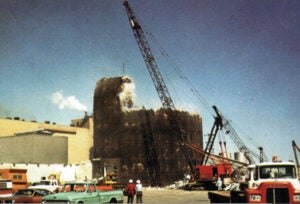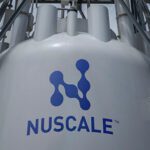NuScale Power, the front-runner in the race to commercialize small modular reactors (SMRs), has bagged another major backer that could broaden its nuclear supply chain base and expand its financial standing.
On April 29, NuScale signed a memorandum of understanding (MOU) with Doosan Heavy Industries and Construction (DHIC), a South Korean–based engineering, procurement, and construction contractor with a wide global network, that supports deployment of NuScale’s Power Module worldwide. “The relationship includes DHIC, a member of the Doosan Group, and potential Korean financial investors, which, commensurate to final due diligence, plan to make a cash equity investment in NuScale,” NuScale said on Monday.
DHIC, which has an integrated manufacturing facility in Changwon, South Korea, that it says is “capable of raw material production to final assembly of nuclear components,” has supplied 32 nuclear reactor vessels and 114 steam generators for nuclear plants in South Korea, China, the U.S., and the United Arab Emirates.
A First-of-its-Kind Nuclear Project
Under the MOU, the companies will negotiate a strategic supplier agreement by July 2019 that would task DHIC with building a portion of the Power Module’s “most critical and complex” sub-assemblies for the plant that NuScale is developing for Utah Associated Municipal Power Systems (UAMPS), the companies said.
That project, which is to be built at a 890-square-mile site at the Department of Energy’s (DOE’s) Idaho National Laboratory near Idaho Falls, will feature a plant comprising a dozen 60-MWe modules. NuScale anticipates the first module could be operational by 2026 and full plant would be operational by 2027.
However, NuScale’s design certification application, which it submitted to the the Nuclear Regulatory Commission (NRC) in December 2016 covers 50-MWe modules. The company increased the module’s capacity to 60-MWe in June 2018, citing optimization through advanced testing and modeling tools. The breakthrough would boost the power capacity of the 12-module UAMPs facility from 600 MWe to 720 MWe, it said.
While the NRC is widely expected to complete its safety evaluation report on the design by September 2020, no date has been scheduled for when it will issue a final design certification. The DOE in December 2018, meanwhile, signed an MOU with project owner UAMPS to purchase power from one of the 12 60-MWe modules and to use another module for research under the Joint Use Modular Plant (JUMP) program.
Still, according to NuScale, the first 12-module facility, even at 684 MWe (net), could cost up to $3 billion to build.
However, it says, because the units require modular construction techniques, much of which is done in a “controlled factory environment,” both cost and quality are improved over previous designs. The design’s modularity also reduces construction timeframes, and NuScale estimates a plant could take only 54 months to build from mobilization to mechanical completion—including 32 months of actual construction following first safety concrete.
“Reduced site construction time as a result of factory manufacturing and modularization reduces financial risk and lowers financing costs,” it said.
Video: NuScale plant construction sequence. Courtesy: NuScale Power
NuScale told POWER on April 30 that UAMPS, which is composed of 47 municipalities in seven Western states, will finance the Idaho Falls project.
A String of Significant MOUs
Still, interest from South Korean financial investors is significant because it could help NuScale build out its U.S.-centered supply chain and “accelerate” the company’s ability to deliver its technology to future customers around the world, said NuScale CEO and Chairman John Hopkins on Monday. “Based upon the international interest in the NuScale design, it is anticipated that significant international capabilities will be needed to meet worldwide needs. DHIC is a highly capable partner to help NuScale meet these market demands.”
For Ki Yong Na, CEO of Doosan’s nuclear power plant business group, the design’s simplicity, safety, and cost-effectiveness, is attractive. “Furthermore, we see great potential for international applications of NuScale’s carbon-free technology, and look forward to collaborating with NuScale as the company pursues additional opportunities.”
The MOU with DHIC comes a month after NuScale signed an MOU with Societatea Nationala Nuclearelectrica, a Romanian energy company, to exchange business and technical information on NuScale’s modules, with the goal to evaluate development, licensing, and construction of an SMR in Romania.
In January, NuScale signed an MOU with the Jordan Atomic Energy Commission (JAEC) to evaluate an SMR plant for use in Jordan. Last November, meanwhile, NuScale and Ontario–based private nuclear generator Bruce Power signed an MOU to develop a business case to introduce an SMR to the Canadian market. It also has an MOU with Ontario Power Generation that supports its vendor design review with the Canadian Safety Commission.
Along with development of its potential customer base, NuScale has reached significant agreements to advance testing and development of the Power Module. In November, the company contracted Minnesota-based PaR Systems to begin engineering work for its reactor building crane (RBC), which a key component of the reactor building that will house the modules. First-phase design work for the RBC is slated to end later this year and fabrication at a “later date.”
And in September, it picked Virginia-based BWX Technologies to begin engineering work to manufacture the SMR. BWXT, a prominent nuclear component and fuel supplier, has already begun the first manufacturing phase, which will continue until June 2020, and NuScale plans to contract for the remaining two phases—preparation for fabrication, and fabrication—“at a later date.” In November 2017, NuScale awarded the initial contract for prototype work for manufacturing its helical coil steam generators to Concurrent Technologies Corp. (CTC), a nonprofit research and development firm.
—Sonal Patel is a POWER associate editor (@sonalcpatel, @POWERmagazine)









